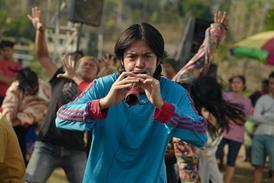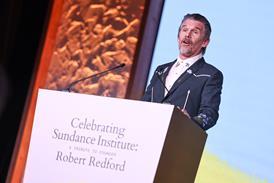
Dir. Gilles Bourdos, France/Canada/Germany, 2008, 107 minutes.
Afterwards requires some serious suspension of disbelief. A man, now a lawyer, who came back from the dead as a boy, meets a doctor with the ability to identify people who are about to die from a white light they emit. That knowledge, imparted solemnly, is intended to bring a new appreciation of life to the characters and the audience.
The stylised parable about living in the present may fly over the heads of US audiences, if it ever reaches beyond the festival-going public. Malkovich is Afterwards’ chief asset there, but audiences are unlikely to warm to the film’s cold palette, its heavy doses of didacticism and its breathy urgency. In Europe, where Romain Duris is also a lure, audiences may have more patience with the style of the film (inspired by a French novel), but could be put off by its pretentious New Age religiosity.
Afterwards opens with an accidental death, in which young Nathan Del Amico is hit and killed by a car - or at least he seems to be dead - and is then revived. We rejoin a mature Nathan (Duris), now a bearded, humourless lawyer, who settles claims made by the families of people killed in plane crashes.
Enter Dr Joseph Kay (Malkovich), a whispery sage who tells the unbelieving Nathan of his power to foresee when a person is nearing death. Nathan eventually believes him, once some of those identified by Dr Kay are killed, and what began as a Stephen King-inspired metaphysical inquiry (The Fifth Mile) shifts into thriller rage-against-death mode as Nathan struggles to save those who have been marked by the distinctive death aura.
In this adaptation of a novel by the French author Guillaume Musso, director Gilles Bourdos shifts his setting from a leafy forest, where the first accident takes place, to a New York notable for its tall glass and steel structures. Dr. Kay moves through the film as if he were a dark-suited prophet, appearing out of nowhere to inform Nathan of his clairvoyance, and reappearing to console others whose time has come.
In the sententious script by Bourdos and Michel Spinosa, Dr Kay tells Nathan that ‘we are messengers.’ We are never told from whom.
Auspicious deaths, all foretold by Dr Kay, are heralded by ominous music by Alexandre Desplat, and a stolid Nathan is ultimately turned loose into the New Mexico landscape where his estranged wife (Lilly) and daughter (Waisglass) now live.
Cinematographer Mark Ping Bing Lee captures green woodlands, claustrophobic New York and the white sands of the Southwest with rapturous precision, but when he shoots the bald Malkovich in soft interiors with a yellow tinge, the eerie effect makes the viewer wonder whether the doctor himself is undergoing chemotherapy.
One terminal soul whom Nathan seeks out, a Russian waitress, is played by actress Pascale Bussieres, with an accent that couldn’t be more French. It’s the least of this film’s problems.
Production Companies
Fidelite Films
Christal Films Productions
Akkord Film Produktion GmbH
Wild Bunch
M6 Films
Mr. Mudd
International Sales
Wild Bunch
+33 6 11 91 23 93
Producers
Olivier Delbosc
Marc Missonnier
Screenplay
Michel Spinosa
Gilles Bourdos, based on the novel Et après… by Guillaume Musso
Production Designer
Anne Pritchard
Cinematographer
Mark Ping Bing Lee
Main Cast
Romain Duris
John Malkovich
Evangeline Lilly
Pascale Bussieres
Reece Thompson
Sara Waisglass

















No comments yet